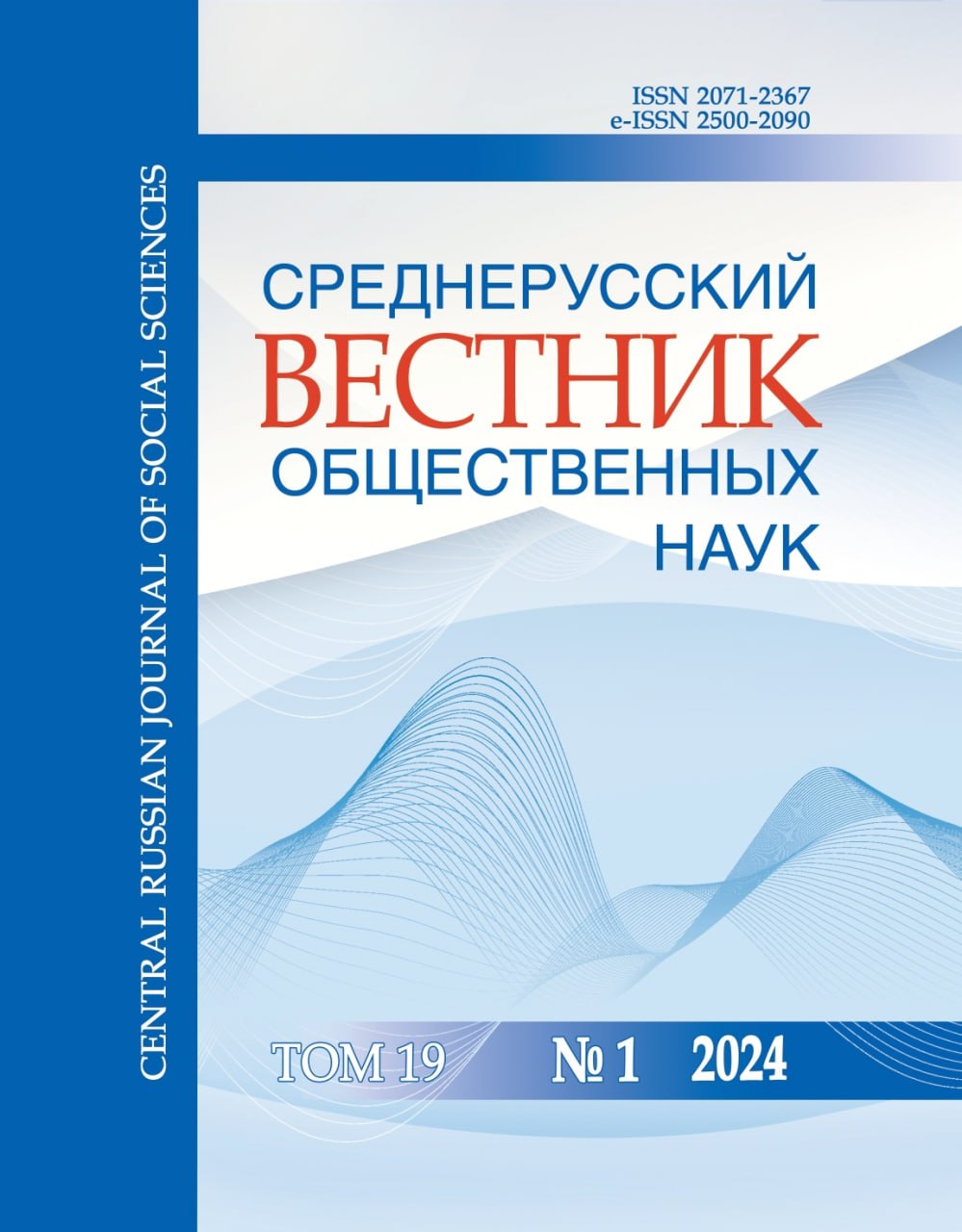Эффективность взаимодействия органов власти с населением в условиях реализации нацпро-ектов: анализ социальных сетей
DOI: 10.22394/2071-2367-2024-19-1-86-105 EDN: BMZGNL
Ключевые слова:
национальные проекты, коммуникация, взаимодействие органов власти с населением, цифровизация, социальные сети, дистанционный анализ, обратная связьАннотация
В современном российском обществе социальные сети стали значимым каналом связи органов власти и населения. Благодаря анализу социальных сетей стало возможным оценивать реакции жителей в реальном времени и выявлять наиболее острые социальные проблемы. В этой связи актуальным становится изучение непосредственного участия населения в практике принятия управленческих решений. Цель – определить эффективность взаимодействия органов власти и населения в социальных сетях. Методология и методы: в статье представлены результаты второй волны анализа данных социальной сети «ВКонтакте» в условиях реализации национальных проектов. Оценка взаимодействия органов власти с населением проводилась по трем основным критериям: исполнению национальных проектов, роли населения в принятии решений, а также наличию элементов коммуникации. Результаты сравнительного исследования (2020 и 2023 гг.) указывают на наличие ряда формальных изменений в организации их взаимодействия. Тем не менее реальная коммуникация между региональной властью и населением остается по-прежнему малоэффективной.
Библиографические ссылки
Богданов В. С., Смирнова А. С. Проблема социологического из-мерения социально-сетевого группообразования в условиях реа-лизации национальных проектов // Научный результат. Социоло-гия и управление. – 2020. – Т. 6, № 4. – С. 146–168. EDN VZCQIS.
Володенков С. В. Трансформация современных политических про-цессов в условиях цифровизации общества: ключевые сценарии // Кон-туры глобальных трансформаций: политика, экономика, право. – 2020. – Т. 13, № 2. – С. 6–25. EDN: MNPUER.
Градосельская Г. В., Карпов И. А., Щеглова Т. Е. Картирование политически активных групп в фейсбуке: динамика 2013–2018 гг. // Вопросы кибербезопасности. – 2019. – № 4 (32). – С. 94–104. DOI: 10.21681/2311-3456-2019-4-94-104. EDN: DN GVJAWS.
Лапин Н. И. Атлас модернизации России и ее регионов: социо-экономические и социокультурные тенденции и проблемы: кол-лективный научный труд / сост. и отв. ред. чл.-корр. РАН Н. И. Лапин. – Москва: Весь Мир, 2016. – 360 с.
Сети 4.0. Управление сложностью // Сборник статей по мате-риалам международных научно-практических конференций, со-стоявшихся в Москве в 2018–2019 годах. – Москва: Всероссийский центр изучения общественного мнения, 2020. – 132 с.
Сморгунов Л. В. Цифровизация и сетевая эффективность гос-ударственной управляемости // Политическая наука. – 2021. – № 3. – С. 13–36. EDN: KHMUCH.
Федуненко Е. «ВКонтакте» интегрируют с «Госуслугами» // Коммерсант. – URL: https://www.kommersant.ru/doc/5572519 (да-та обращения: 10.09.2023).
Bennett W. L., Pfetsch B. Rethinking Political Communication in a Time of Disrupted Public Spheres. Journal of Communication. – 2018. – 68(2). – P. 243 – 253.
Khosravinik M. Social Media Techno-Discursive Design, Affective Communication and Contemporary Politics. Fudan Journal of the Hu-manities and Social Sciences. – 2018. – Vol. 11, No. 4. – P. 427 – 442.
Parés M., Bonet-Martí J., Martí-Costa M. Does Participation Really Matter in Urban Regeneration Policies? Exploring Governance Networks in Catalonia (Spain). Urban Affairs Review. – 2011. – 48 (2). – P. 238 – 271.
Recommendation of the Council on Digital Government Strate-gies. Adopted by the OECD Council on 15 July 2014 // OECD. – URL: https://www.oecd.org/gov/digital-government/Recommendation-digital-government-strategies.pdf (дата обращения: 29.09.2023).
References:
Bogdanov, V. S., Smirnova, A. S. (2020) Problema sotsiologicheskogo izmereniia sotsial'no-setevogo gruppoobrazovaniia v usloviiakh realizatsii natsional'nykh proektov. Nauchnyi rezul'tat. Sotsiologiia i upravlenie. Vol. 6, no. 4, p. 146–168.
Volodenkov, S. V. (2020) Transformatsiia sovremennykh politicheskikh protsessov v usloviiakh tsifrovizatsii obshchestva: kliuchevye stsenarii. Kontury global'nykh transformatsii: politika, ekonomika, pravo. Vol. 13, no. 2. – p. 6–25.
Gradosel'skaia, G. V., Karpov, I. A., Shcheglova, T. E. (2019) Kartirovanie politicheski aktivnykh grupp v feisbuke: dinamika 2013–2018 gg. Voprosy kiberbezopasnosti. no.4 (32). p. 94–104. DOI: 10.21681/2311-3456-2019-4-94-104. EDN: DN GVJAWS.
Lapin, N. I. (2016) Atlas modernizatsii Rossii i ee regionov: sotsioekonomicheskie i sotsiokul'turnye tendentsii i problemy: kollektivnyi nauchnyi trud / sost. i otv. red. chl.-korr. RAN N. I. Lapin. Moskva: Ves' Mir, 360 p.
Seti 4.0. Upravlenie slozhnost'iu. Sbornik statei po materialam mezhdunarodnykh nauchno-prakticheskikh konferentsii, sostoiavshikhsia v Moskve v 2018–2019 godakh. – Moskva: Vserossiiskii tsentr izucheniia obshchestvennogo mneniia, 2020. 132 p.
Smorgunov, L. V. (2021) Tsifrovizatsiia i setevaia effektivnost' gosudarstvennoi upravliaemosti. Politicheskaia nauka. no. 3, p. 13–36.
Fedunenko, E. «VKontakte» integriruiut s «Gosuslugami». Kommersant. – URL: https://www.kommersant.ru/doc/5572519 (data obrashcheniia: 10.09.2023).
Bennett , W. L., Pfetsch, B. (2018) Rethinking Political Communi-cation in a Time of Disrupted Public Spheres .Journal of Communica-tion. 68(2). – P. 243 – 253.
Khosravinik, M. (2018) Social Media Techno-Discursive Design,
Affective Communication and Contemporary Politics. Fudan Journal of the Humanities and Social Sciences. Vol. 11, no. 4. P. 427 – 442.
Parés, M., Bonet-Martí, J., Martí-Costa, M. (2011) Does Participa-tion Really Matter in Urban Regeneration Policies? Exploring Govern-ance Networks in Catalonia (Spain). Urban Affairs Review. Vol. 48,
no. 2, P. 238 – 271.
Recommendation of the Council on Digital Government Strategies. Adopted by the OECD Council on 15 July 2014. OECD. – URL: https://www.oecd.org/gov/digital-government/Recommendation-digital-government-strategies.pdf (дата обращения: 29.09.2023).

Загрузки
Опубликован
Как цитировать
Выпуск
Раздел
Лицензия
Copyright (c) 2024 Мерзляков Андрей Александрович Гусейнова Ксения Эльдаровна Смирнова Анастасия Сергеевна

Это произведение доступно по лицензии Creative Commons «Attribution-NonCommercial» («Атрибуция — Некоммерческое использование») 4.0 Всемирная.



